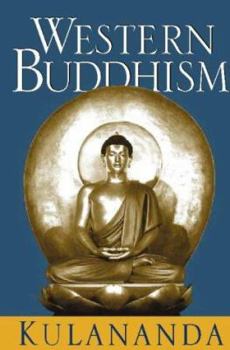Western Buddhism: New Insight Into the West Fastest Growing Religion
In this groundbreaking book, Kulananda explains many of the important Buddhist traditional teachings in simple terms. He clarifies how these teachings can be integrated into Western culture and... This description may be from another edition of this product.
Format:Paperback
Language:English
ISBN:0722532326
ISBN13:9780722532324
Release Date:January 1997
Publisher:Thorsons Publishers
Length:240 Pages
Weight:0.25 lbs.
Dimensions:0.7" x 5.4" x 8.5"
Customer Reviews
3 ratings
What Western Buddhists Are Up To
Published by Thriftbooks.com User , 21 years ago
With Buddhism becoming firmly rooted in Western cultures, a number of authors are taking a look at what is happening in the process. Just as Buddhism was transformed when it entered Tibetan, Chinese, or Japanese society, so it is finding itself being reformed by a Western context. Kulananda takes a topical approach to the subject. He first locates the reader by giving a brief over-view of basic Buddhist beliefs, and then surveys a number of philosophical and practical issues in Buddhist life and how they are being experienced by people practicing Buddhism in the West. He casts a probing, and sometimes critical, eye at the Buddhist heritage the West is inheriting. It is rather interesting to see the something old, something new approach to this wedding between Westerners and Buddhists as they decide what to keep and what to modify. The only bothersome thing I would point out is this: Kulananda makes a number of statements about truths and ethics. What he doesn't seem to recognize is that if what he says about them is accurate, he has undercut his own position, as well.
holding a lotus to a rock
Published by Thriftbooks.com User , 23 years ago
Towards the end of this book, Kunananda quotes the German philosopher Goethe: 'Whoever knows others as well as himself, must also recognise that East and West are now inseparable' (p.211). In many respects the reception of Buddhism in Europe and America is a test case for this assertion. Is Buddhism inherently 'Eastern', unbreakably connected to the cultures in which it developed, Indian, Sri Lankan, Tibetan, Chinese, Japanese, Korean and so on, or is it capable of transition to a different set of cultures: can it become 'Western'? It has been said that bringing Buddhism to the west is like holding a lotus to a rock and waiting for it to take root. In actuality Buddhism has already become western, and is now the fastest growing religion in France and Australia, but at what cost to its integrity? How has its encounter with the west changed it into something new? Kulananda provides an insightful map of this new territory, both introducing key Buddhist concepts and showing how the dharma has adapted to each new culture it has encountered. He consistently combines intelligence with readability as he offers an overview of 'western Buddhism', warts and all. I found the chapter on Buddhism and the cultural self-doubt of the west particularly interesting. Coming from the Friends of the Western Buddhist Order, kulananda is less dispassionate about this group than about some others, but this mainly serves to give credence to the lived experience out of which he writes. I cannot fault this book, but it did make me wonder whether the concepts of 'eastern' and 'western' will continue to have much credibility in the twenty-first century. There is surely something perverse about western capitalism's systematic destruction of traditional Buddhist cultures such as that of Thailand, at the same time that Thai forest Buddhism is gaining increasing numbers of western converts. In this transnational cultural exchange, why is it that the west gets religion but the east gets economics? In this context, Kulananda is surely charting not 'east' or 'west' but Buddhism as a global phenomenon, whose future, as that of the planet, is unknown.
An astounding book
Published by Thriftbooks.com User , 24 years ago
There's not really all that much I haven't read before in this book, but the clarity it's worded with had a profound effect on me. I found his specific practice suggestions helpful, but what made the strongest impression on me is the way he presents Buddhism in the context of the modern world. He starts with the profound existential insights of the Buddha, and clearly applies them to the world we find ourselves in today. This book has shaken me up in a scary and uplifting way. I've become very aware of how much I rely on my habitual environment to maintain my sense of self. He sets a big challenge in front of anyone who reads this book. Highly recommended.





